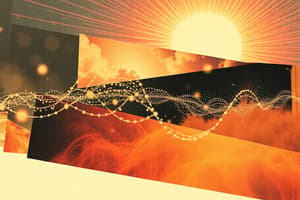Podcast
Questions and Answers
What is the relationship between the energy and frequency of a photon in quantum mechanics?
What is the relationship between the energy and frequency of a photon in quantum mechanics?
- The energy level is independent of the frequency of the photon
- The energy level is proportional to the square of the frequency of the photon
- The energy level decreases with the frequency of the photon
- The energy level increases with the frequency of the photon (correct)
What happens to electromagnetic radiation when it is absorbed by an object?
What happens to electromagnetic radiation when it is absorbed by an object?
- The energy is reflected back into space
- The energy is stored as chemical energy
- The energy is converted to heat or kinetic energy in the particles of the object (correct)
- The energy is converted to gravitational radiation
What is the speed of electromagnetic radiation in a vacuum?
What is the speed of electromagnetic radiation in a vacuum?
- ~200,000,000 meters per second
- ~300,000,000 meters per second (correct)
- ~400,000,000 meters per second
- ~100,000,000 meters per second
What is the purpose of radio astronomy?
What is the purpose of radio astronomy?
What is an example of radiant energy being utilized and produced through technology?
What is an example of radiant energy being utilized and produced through technology?
What is the sequence of the electromagnetic spectrum from lowest to highest frequency?
What is the sequence of the electromagnetic spectrum from lowest to highest frequency?
What is the process by which stars produce their radiant energy?
What is the process by which stars produce their radiant energy?
What is the source of all nuclear energy on Earth?
What is the source of all nuclear energy on Earth?
What is the ultimate source of energy for life on Earth?
What is the ultimate source of energy for life on Earth?
What is an example of radiant energy used by organisms?
What is an example of radiant energy used by organisms?
What is the primary difference between radiant energy and sound energy?
What is the primary difference between radiant energy and sound energy?
Which measurement unit is used to express radiant energy?
Which measurement unit is used to express radiant energy?
What discovery did William Herschel make regarding sunlight?
What discovery did William Herschel make regarding sunlight?
What technique is used to measure the power of electromagnetic radiation?
What technique is used to measure the power of electromagnetic radiation?
Which statement about visible light in relation to radiant energy is accurate?
Which statement about visible light in relation to radiant energy is accurate?
What is the ultimate source of energy for all life on Earth?
What is the ultimate source of energy for all life on Earth?
What is the process that converts chemical energy stored in fossils back into radiant energy?
What is the process that converts chemical energy stored in fossils back into radiant energy?
What is the role of radioactive elements in nuclear power plants?
What is the role of radioactive elements in nuclear power plants?
What is the connection between human beings and fossil fuels?
What is the connection between human beings and fossil fuels?
What is a key difference between fossil fuels and radioactive elements as energy sources?
What is a key difference between fossil fuels and radioactive elements as energy sources?
Flashcards are hidden until you start studying
Study Notes
Radiant Energy Overview
- Radiant energy is energy transferred via electromagnetic and gravitational waves, able to move through the vacuum of space.
- It differs from sound and water waves as it does not require a medium (like matter) for transfer.
- Measured in joules (J), radiant energy can enter or leave a system, exemplified by a campfire where chemical potential energy transforms into radiant energy.
Electromagnetic Radiation
- Visible light is a type of electromagnetic radiation, part of the broader electromagnetic spectrum.
- Key historical experiments, such as Thomas Young's double slit experiment, demonstrated the wave-like properties of light through interference patterns.
- Infrared radiation was the first part of the electromagnetic spectrum discovered, recognized by William Herschel when he measured temperature beyond the red spectrum of sunlight.
Measuring Radiant Energy
- Radiometry measures electromagnetic radiation using devices like radiometers, assessing radiation flux in watts or joules per second.
- Radiometric techniques are crucial in fields like radio astronomy and remote sensing.
Electromagnetic Waves and Photons
- Electromagnetic radiation can be viewed as oscillating waves or streams of photons, with oscillations in electric and magnetic fields being perpendicular to the wave direction.
- In quantum mechanics, photons are massless quanta with energy related to their frequency by Planck's equation: E=hf, where E is energy, h is Planck's constant, and f is frequency.
Interaction with Matter
- Photons can be absorbed or emitted by atoms during electron transitions between energy levels, leading to heat or kinetic energy transfer.
- Both classical physics and quantum mechanics recognize that electromagnetic radiation travels at approximately 300,000,000 meters per second in a vacuum.
Gravitational Waves
- Similar to electromagnetic radiation, gravitational radiation consists of waves propagating through spacetime, also traveling at the speed of light.
- Direct detection of gravitational waves occurred in 2015, confirming Einstein's theory of gravity.
Practical Applications of Radiant Energy
- Radiant energy is exploited in radio astronomy, telecommunications, and various technologies like solar energy collectors, thermal heating lamps, and visible light screens.
- Solar energy collectors utilize radiant energy from the sun, converting it into chemical energy for later electricity use.
Electromagnetic Spectrum and Examples
- The electromagnetic spectrum encompasses various wave types, ranging from radio waves (telecommunications) to gamma rays (medical treatments):
- Radio waves: Used in communication and astronomy.
- Microwaves: Used in radar and telecommunications.
- Infrared: Involved in security systems and produced by body heat.
- Visible light: The spectrum visible to human eyes.
- Ultraviolet: Associated with tanning and preventing sunburn.
- X-rays: Used in medical exams and astronomy.
- Gamma rays: Applied in cancer treatment and nuclear energy.
Cosmic Origins of Radiant Energy
- All energy on Earth derives from radiant sources, primarily the sun, which produces energy through nuclear fusion processes.
- Elements produced during supernovae form the basis of Earth's chemical elements and contribute to the biosphere, with plants converting sunlight into usable energy through photosynthesis.
Radiant Energy in Ecosystems and Technology
- Life forms utilize thermal radiant energy produced by geological processes and photosynthesis, building the foundation for ecological cycles.
- Fossil fuels consist of energy stored from ancient biomass transformed over millennia, while nuclear power plants harness radioactive decay to produce electricity through heat generation.
Studying That Suits You
Use AI to generate personalized quizzes and flashcards to suit your learning preferences.




